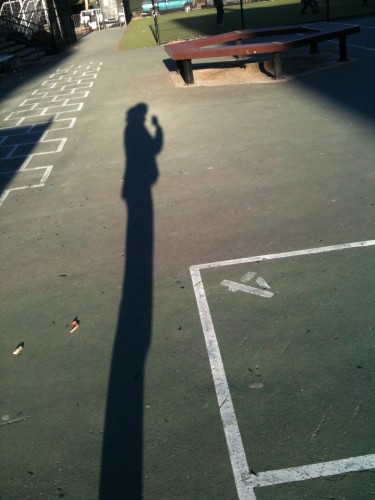I’ve been thinking about my post yesterday, and dwelling more in my memories of the dark period after Grace was born. It strikes me that in many ways that episode of PPD was a microcosm of the problem that’s plagued my whole life. It was about the past and the future occluding my ability to see the beauty heaped at my feet in my present. This is the task of my life, that is becoming clear. And not just my life: I think this is a universal struggle.
As I panicked about my future as a mother, about the fact that I would never sleep again and my colicky baby would never stop crying, preemptive regret clouded the riches of the moment. I am so quick to assume that the difficulty of a moment will endure forever and ever. I did that, in the dark nights of Grace’s infancy, and to this day when I think about it I am overcome with despair that I can’t remember her first bath, when her cord stump fell off, of the seductive newborn smell of her hair.
It is as though I cannot allow myself to feel the glory of right now. What am I afraid of? Of staring into the sun? I seem to believe that by anticipating fear, regret, sadness, I feel I innoculate myself against it. Of course I see rationally that this is absolutely wrong. These sad emotions are knit into my experience inextricably, but by assuming that they are coming I allow them to permeate even the moments that they do not own.
My postpartum depression was an exaggerated version of a struggle that has shaped my whole life. It was, I hope, the universe throwing cold water in my face and asking me to stop. To look around, see the truth and gorgeousness available in my ordinary life, and to live it.
And there is so much glory in this life! So much grandeur. Just this morning as I drove my children to school I pulled over to photograph the sunlight glinting off of the snowy trees. It was breathtaking. I must allow that more. I know that sadness is coming to me, as surely as a tide returning to shore. I must learn not to fear this, but to enjoy the times when that tide is out. I am certain my life contains as many moments of pure joy as anyone’s. My problem is not recognizing them, but allowing myself to relax into them. To feel a moment’s beauty, even with the certainty that clouds will return.
The push and pull of light and shadow inside my spirit will continue for the rest of my life, I know that. I don’t want to keep missing the light for anxious anticipation of the shadow. The grace of Grace’s arrival was my first big lesson in that, and there have been others, and there will be more. My brain must get out of my heart’s way.
The Weepies’ All This Beauty is playing in my mind today – I think it gets at this point.

